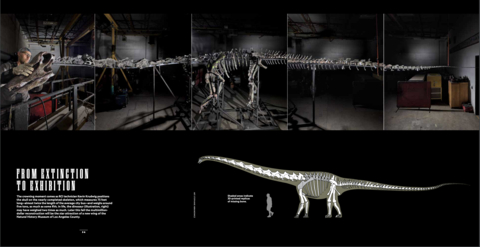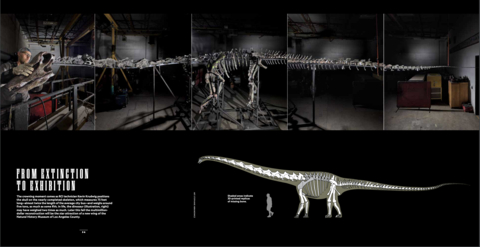WASHINGTON--(BUSINESS WIRE)--National Geographic:
The discovery, recovery and reassembly of the 150-million-year-old rare dinosaur found in remote Utah is finally complete! Standing at 75 feet long (nearly twice the length of a city bus) and weighing roughly 5 tons (around the same as an RV), the sturdy, long-necked specimen is the first GREEN dino skeleton to be mounted for display worldwide. Ahead of its public debut, National Geographic is offering an exclusive preview of the towering dino and an inside look at the behind-the-scenes process from ground to mount.
A decade in the making, National Geographic began documenting the painstaking excavation and reconstruction in collaboration with the Natural History Museum of Los Angeles County’s (NHMLAC) Dinosaur Institute. Sifting through a logjam of dino parts entombed in tons of rock in their excavation and hampered by rattlesnakes and the gnats that gave the specimen its nickname, the team quickly realized “Gnatalie,” as the dino was dubbed, was unique in ways that may be new to science.
Not only is Gnatalie the most complete Sauropod skeletal mount on the West Coast, but with its long neck, tail and four sturdy legs, scientists believe it may be a new species of dinosaur that belongs to the family that includes Diplodocus. Its preservation occurred due to a rare combination of volcanic activity around 80-50 million years ago, which made it hot enough for a new green mineral to replace an earlier mineral, giving the dino’s skeleton its unusual green color.
To see the fully reconstructed dinosaur and for the full story behind it, read the National Geographic exclusive in the September issue and on NatGeo.com.
VISUALS AVAILABLE:
SPOKESPEOPLE AVAILABLE:
- Dr. Luis Chiappe, senior vice president of Research and Collections, and Gretchen Augustyn director and curator, Dinosaur Institute at the Natural History Museum of Los Angeles County
- Dr. Nate Smith, curator of the Dinosaur Institute at the Natural History Museum of Los Angeles County




